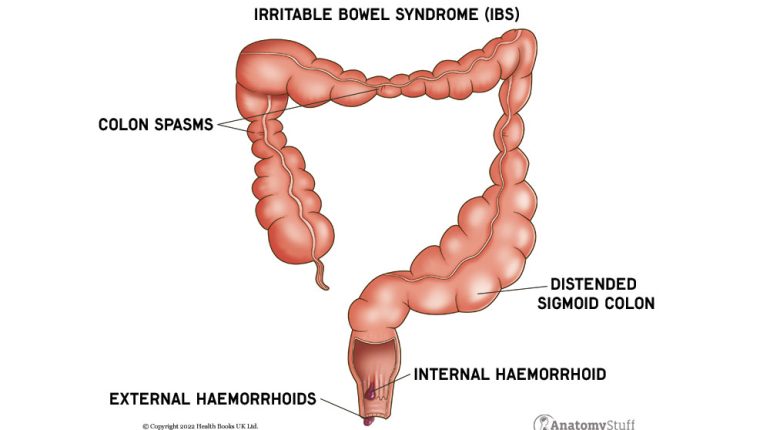Irritable Bowel Syndrome (IBS) is a common disorder that affects the large intestine, causing symptoms such as cramping, abdominal pain, bloating, gas, and diarrhea or constipation, or both. While IBS can be a chronic condition requiring long-term management, many people can control their symptoms with diet, lifestyle changes, and stress management. This article provides simple and useful information to help manage IBS effectively.
Understanding IBS
IBS is a functional gastrointestinal (GI) disorder, meaning it is characterized by a group of symptoms that occur together without any visible signs of damage or disease in the digestive tract. The exact cause of IBS is not known, but several factors are believed to play a role:
Muscle Contractions in the Intestine: Stronger or prolonged contractions can cause gas, bloating, and diarrhea, while weak intestinal contractions can slow food passage and lead to hard, dry stools.
Nervous System: Poorly coordinated signals between the brain and the intestines can cause the body to overreact to changes that normally occur in the digestive process, resulting in pain or discomfort.
Inflammation in the Intestines: Some people with IBS have an increased number of immune-system cells in their intestines, which can cause pain and diarrhea.
Severe Infection: IBS can develop after a severe bout of diarrhea (gastroenteritis) caused by bacteria or a virus. IBS might also be associated with a surplus of bacteria in the intestines (bacterial overgrowth).
Changes in Microbiome: Microbiome refers to the bacteria, fungi, and viruses that live in the intestines and play a key role in health. Research indicates that the microbiome of people with IBS might differ from that of healthy individuals.
Symptoms of IBS
Common symptoms of IBS include:
Abdominal pain or cramping
Bloating
Gas
Diarrhea or constipation, sometimes alternating
Mucus in the stool
Symptoms can vary in severity and duration from person to person. It’s important to consult with a healthcare provider for a proper diagnosis and personalized management plan.

Managing IBS Through Diet
Diet plays a crucial role in managing IBS symptoms. Here are some dietary tips to help control IBS:
Low FODMAP Diet: FODMAPs are types of carbohydrates that can be difficult to digest. A low FODMAP diet can help reduce IBS symptoms. Foods high in FODMAPs include certain fruits, vegetables, dairy products, wheat, and beans. Consulting with a dietitian can help in planning a low FODMAP diet.
High-Fiber Foods: Fiber can help with constipation, but it may also worsen gas and cramping. Gradually increase fiber intake and focus on soluble fibers found in foods such as fruits, vegetables, and oats. Avoid insoluble fibers like whole grains and bran which can exacerbate symptoms.
Hydration: Drinking plenty of fluids, especially water, can help with digestion and prevent constipation. Avoid caffeinated, carbonated, and alcoholic beverages, which can aggravate symptoms.
Avoid Trigger Foods: Certain foods can trigger IBS symptoms. Common triggers include fatty foods, spicy foods, dairy products, and artificial sweeteners. Keeping a food diary can help identify and eliminate these triggers.
Eat Smaller, Frequent Meals: Large meals can cause cramping and diarrhea. Eating smaller, more frequent meals can help manage symptoms more effectively.
Lifestyle Changes for IBS Management
In addition to dietary changes, several lifestyle modifications can help manage IBS:
Regular Exercise: Physical activity helps stimulate normal contractions of the intestines and can improve symptoms of IBS. Aim for at least 30 minutes of moderate exercise most days of the week.
Stress Management: Stress can worsen IBS symptoms. Techniques such as yoga, meditation, deep breathing exercises, and progressive muscle relaxation can help reduce stress levels.
Sleep Well: Getting enough sleep is crucial for overall health and can help reduce the severity of IBS symptoms. Aim for 7-9 hours of sleep per night and maintain a regular sleep schedule.
Mind-Body Therapies: Therapies such as cognitive-behavioral therapy (CBT), hypnotherapy, and biofeedback can help manage the psychological aspects of IBS and improve symptom control.
Medications and Other Treatments
In some cases, dietary and lifestyle changes may not be sufficient to manage IBS symptoms, and medications or other treatments may be necessary:
Fiber Supplements: If dietary fiber doesn’t help, taking fiber supplements like psyllium (Metamucil) can be beneficial.
Laxatives: For those with constipation, laxatives can help, but they should be used under the guidance of a healthcare provider.
Anti-Diarrheal Medications: Medications like loperamide (Imodium) can help control diarrhea.
Antispasmodics: These medications can help reduce abdominal pain and cramping by relaxing the muscles in the gut.
Antidepressants: Low doses of tricyclic antidepressants or selective serotonin reuptake inhibitors (SSRIs) can help relieve pain and other symptoms in some people with IBS.
Probiotics: These supplements can help maintain the balance of good bacteria in the intestines and may help alleviate symptoms of IBS.
Peppermint Oil: Peppermint oil capsules can help reduce abdominal pain and bloating by relaxing the muscles of the intestines.
When to See a Doctor
It’s important to consult with a healthcare provider if you experience any of the following symptoms, as they may indicate a more serious condition:
Persistent pain that isn’t relieved by passing gas or a bowel movement
Weight loss
Diarrhea or constipation that awakens you from sleep
Rectal bleeding
Anemia related to low iron
Managing Irritable Bowel Syndrome (IBS) involves a combination of dietary changes, lifestyle modifications, and sometimes medications. By understanding and avoiding triggers, incorporating a balanced diet, staying physically active, and managing stress, individuals with IBS can significantly improve their quality of life. Always consult with a healthcare provider for a personalized approach to managing IBS and to rule out other conditions. With the right strategies, it’s possible to lead a comfortable and fulfilling life despite IBS.


















